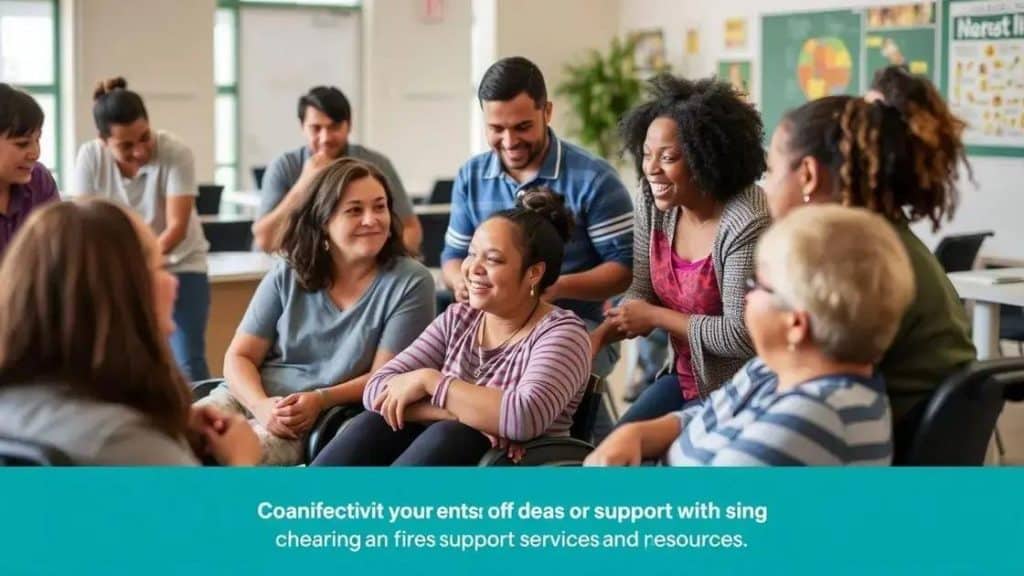Majority disability support info: what you need to know

Majority disability support involves accessing various resources, including financial assistance, healthcare services, and community networks to help individuals with disabilities navigate their unique challenges.
Majority disability support info is crucial for anyone looking to navigate the complex landscape of assistance available to individuals with disabilities. Have you ever wondered what resources might be at your disposal? Let’s dive into the key topics.
Understanding majority disability support options
When it comes to understanding majority disability support options, it’s important to know what resources are available and how they can assist individuals with disabilities. There are numerous programs designed to provide financial aid, services, and resources to those in need.
In many cases, these options can vary by state or region, so it’s essential to research local offerings. Understanding these differences can be daunting, but there are several common types of support available nationwide.
Types of Disability Support Options
Disability support can come in various forms. Here are a few key options:
- Social Security Disability Insurance (SSDI): This program offers financial benefits to individuals who have worked and paid into the Social Security system.
- Supplemental Security Income (SSI): This is a need-based program that provides financial assistance to low-income individuals with disabilities.
- State disability programs: Many states offer their own disability support programs, which may include assistance with medical care, housing, and other essential services.
- Employment support services: These services help individuals with disabilities find and maintain employment, offering training and job placement assistance.
In addition to financial support, many organizations provide resources for healthcare access and advocacy. For example, non-profit organizations are often instrumental in helping navigate the complex application process for various benefits.
It’s also worth noting that eligibility requirements can differ significantly between programs. Therefore, it’s beneficial to understand these prerequisites in detail. For instance, SSDI requires a work history while SSI focuses more on financial need.
As individuals explore their options, they may encounter various application processes and time frames. Being prepared and informed is crucial to maximize the potential benefits.
Finding the Right Support
When seeking out the right majority disability support, having the right resources is key. Connecting with local organizations and support groups can make a difference in navigating options. Here are some tips for finding the right support:
- Research local agencies and non-profits.
- Utilize online resources and forums.
- Seek advice from friends or family members who have experience.
- Don’t hesitate to ask questions or request help during the application process.
Bringing together personal insight and community support can empower individuals with disabilities to access the assistance they deserve. Understanding these options and how to navigate them is a vital step toward enhancing quality of life and achieving independence.
How to apply for disability support services

Applying for disability support services can seem overwhelming. However, it’s a vital step to access the assistance you need. It often involves understanding the requirements and filling out detailed applications. Let’s break down the process into manageable steps.
To start, gathering necessary documentation is key. This may include medical records, proof of income, and identification. Having all your information ready can help streamline the application process.
Step-by-Step Application Process
The application itself usually involves several steps. Here’s a simple outline of what to expect:
- Research your options: Understand the types of aid available and the specific programs that best fit your needs.
- Complete the application: Fill out the required forms, ensuring all information is accurate and up-to-date.
- Submit documentation: Include all relevant documents to support your application.
- Follow up: After submission, checking on your application status can be beneficial.
Remember, be thorough in completing your applications. Even small errors can lead to delays. If you find the process confusing, consider reaching out for help.
Many organizations offer assistance with the application process, including local non-profits and community services. They can provide valuable guidance and support. Having someone to assist you can make a big difference.
Tips for a Successful Application
Being prepared can significantly improve your chances of approval. Here are some tips:
- Double-check all forms and documents for completeness.
- Be honest and clear about your situation.
- Meet all deadlines to avoid complications.
- If denied, look into the appeal process.
Taking these steps can make the journey much smoother. By proactively addressing your application, you’re setting yourself up for success in receiving the necessary support. Remember, you are not alone in this process, and there are resources available to help you navigate it.
Resources for individuals with disabilities
There are many valuable resources for individuals with disabilities that can offer support, information, and assistance. Knowing where to find these resources is essential for accessing the help you may need. Various organizations and services are dedicated to providing support.
These resources can range from financial aid programs to community organizations aiming to improve the quality of life for individuals with disabilities. When searching for help, it’s important to consider both local and national options.
Types of Resources Available
Here are some common categories of resources that individuals can explore:
- Financial Assistance Programs: Many organizations offer financial support to help cover living expenses.
- Healthcare Services: Accessing medical care is crucial, and there are programs specifically for individuals with disabilities.
- Support Groups: Connecting with others who share similar experiences can provide emotional support and advice.
- Educational Resources: Programs that support skill development and education can enhance job prospects and independence.
Finding resources can be as simple as doing a quick online search, but it’s also helpful to connect with local government agencies or non-profit organizations. They can provide tailored assistance based on specific needs.
In addition, many websites and databases compile resources specifically for individuals with disabilities. These resources include information on job placement, mentorship programs, and ways to enhance daily living.
Utilizing Community Resources
Don’t overlook the importance of community resources. Local non-profits often have programs aimed at providing direct support. Many cities also have community centers that offer workshops and information sessions about available services.
One effective way to find these resources is through networking. Engaging with others in your community might lead to discovering hidden gems in terms of support services. Consider visiting local libraries or community fairs where organizations may showcase their offerings.
Being proactive in seeking out these resources for individuals with disabilities can significantly enhance your quality of life. By taking steps to tap into available support, you can better navigate day-to-day challenges. Remember, you are not alone on this journey; numerous tools and support systems are ready to help.
Common challenges and solutions in accessing support

Accessing support can be difficult for individuals with disabilities. Many face unique challenges that can make it tough to receive the help they need. Identifying these common challenges is the first step toward finding effective solutions.
One major issue is the complexity of application processes. Many forms require detailed information that can be hard to gather. This can discourage individuals from applying altogether. Additionally, long wait times for approval can cause frustration and uncertainty.
Key Challenges in Accessing Support
Some of the primary challenges include:
- Limited awareness: Many individuals are unaware of the resources available to them.
- Eligibility criteria: Confusing eligibility requirements can prevent people from applying.
- Application complexities: The paperwork can be overwhelming and difficult to navigate.
- Stigma and fear: Some may hesitate to seek help due to stigma or fear of being judged.
Despite these challenges, there are solutions available to help individuals overcome these barriers. Increasing awareness is essential. Community outreach programs can educate individuals about available resources and how to access them.
Support groups also play a vital role in this process. By connecting with others who have similar experiences, individuals can share tips and encouragement. This can also help reduce feelings of isolation.
Solutions to Improve Access
Finding solutions to these challenges is crucial. Here are some effective strategies:
- Simplified application processes: Advocacy for streamlined forms can reduce the burden of paperwork.
- Resource guides: Creating easy-to-understand guides can help clarify eligibility and application steps.
- Awareness campaigns: Promoting available resources through community events or social media can reach a broader audience.
- Training for professionals: Ensuring that service providers are well-trained can improve the support individuals receive.
By actively working to address these challenges, individuals can gain better access to the support they need. It is essential to keep pushing for improvements in the systems that provide assistance to ensure everyone can benefit from available support.
In summary, accessing disability support comes with challenges, but understanding these difficulties can lead to effective solutions. By identifying the common hurdles, including complex applications and limited awareness, we can work together to improve access to resources. Utilizing community support, simplifying application processes, and promoting available options are key steps toward enhancing the experience for individuals with disabilities. Remember, you are not alone, and there are numerous resources available to help you navigate these challenges.
FAQ – Frequently Asked Questions about Disability Support
What are the common challenges faced when applying for disability support?
Common challenges include complex application processes, limited awareness of available resources, and unclear eligibility criteria.
How can I improve my chances of getting disability support?
To improve your chances, ensure your application is complete, gather all necessary documents, and consider seeking help from local advocacy groups.
Where can I find resources for individuals with disabilities?
You can find resources through community organizations, local government agencies, and various online platforms dedicated to disability support.
What should I do if my application for support is denied?
If your application is denied, you can look into the appeals process, seek assistance from advocacy organizations, and review your application for any errors.





